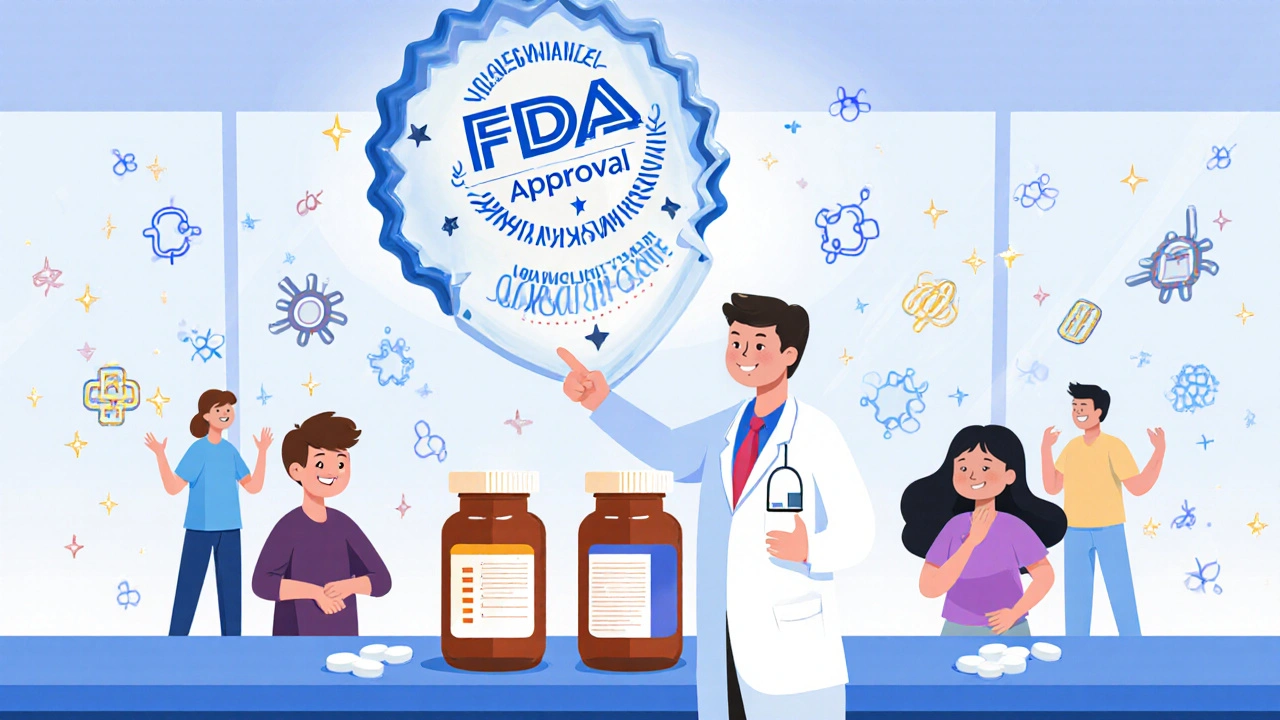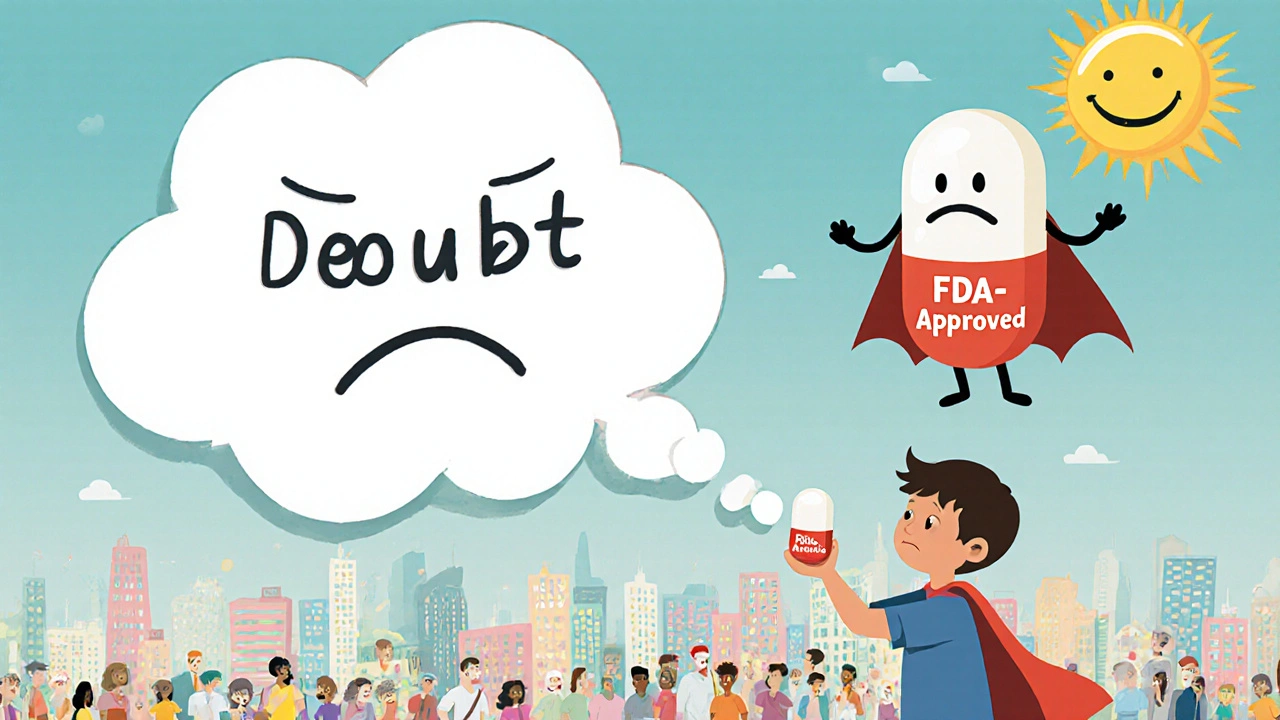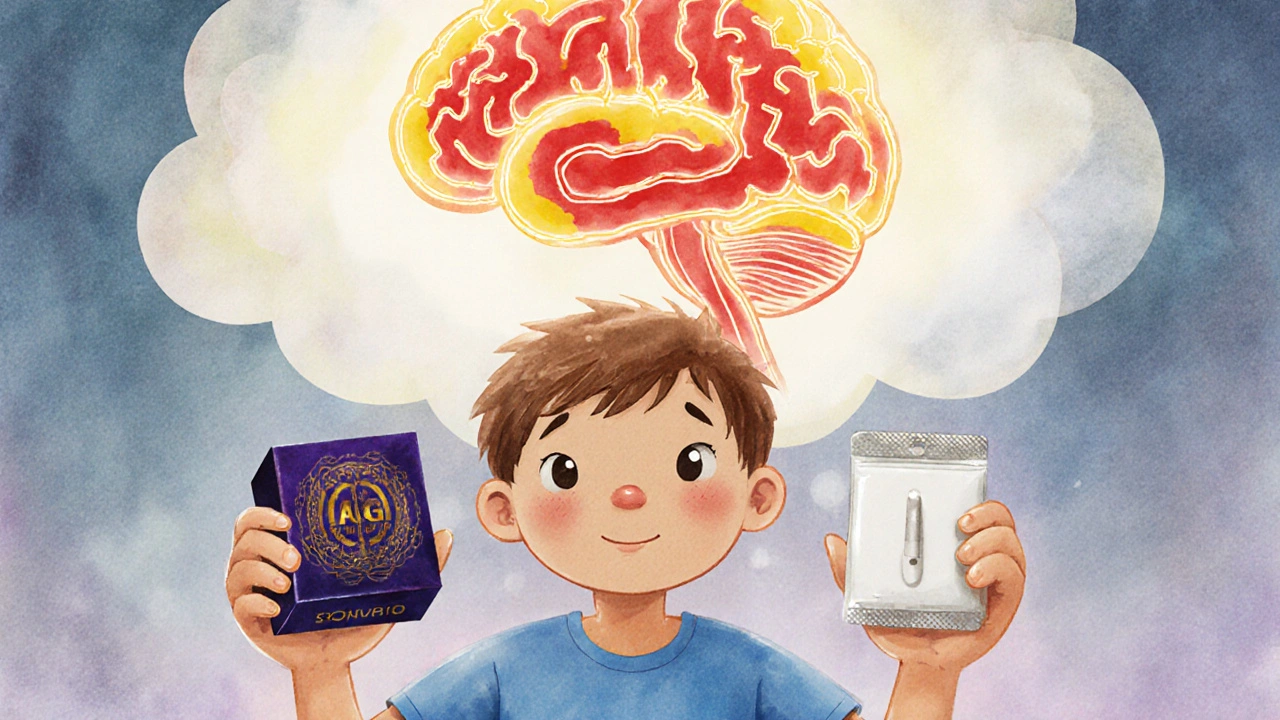When you pick up a prescription, do you ever wonder why some people say their generic pill doesn’t work as well as the brand name-even though both contain the exact same active ingredient? It’s not just in their head. It’s in their perception.
Studies show that the color of a pill, the price on the label, even the name on the bottle can change how your body responds. You might feel better-or worse-based on what you believe you’re taking, not what’s actually inside. This isn’t magic. It’s science. And it’s happening every day in pharmacies, clinics, and homes around the world.
Branding Tricks Your Brain
In a 2016 study, researchers gave people fake painkillers labeled as either "Nurofen" or "Generic Ibuprofen." Both were sugar pills. But the group who thought they were taking Nurofen reported pain relief just as strong as if they’d taken real ibuprofen. The other group? Their pain barely budged.
That’s not a fluke. Brain scans from similar experiments show that when people believe they’re taking a brand-name drug, areas of the brain linked to expectation and reward light up more. The dorsomedial prefrontal cortex, which helps process belief and anticipation, becomes more active. Your brain doesn’t just *think* the pill works-it *prepares your body* to feel better.
It’s the same reason a $100 cream feels more effective than a $5 cream-even if they’re chemically identical. In one experiment, people who thought they were using an expensive pain cream reported twice as much pain as those using the same cream labeled as cheap. Their spinal cords even showed stronger pain signals. The drug didn’t change. Their belief did.
Generics Get a Bad Rap
Even though the FDA requires generic drugs to match brand-name drugs in strength, dosage, and absorption, many people still think they’re inferior. A 2022 survey found that 63% of Americans believe brand-name drugs are better. That’s not based on evidence. It’s based on marketing, packaging, and years of messaging that equate price with quality.
That perception has real consequences. People on generic antidepressants are 27% more likely to stop taking them within the first month compared to those on brand-name versions-even though blood tests confirm identical drug levels. The same pattern shows up with blood pressure meds, statins, and even migraine pills.
And it’s not just about stopping meds. People on generics report more side effects-even when they’re taking a placebo. In one study, patients taking dummy pills for statins complained of muscle pain, fatigue, and stomach issues. They weren’t lying. Their brains, primed by the idea that "generic = weaker," were interpreting normal sensations as side effects. That’s the nocebo effect: negative expectations causing real symptoms.
Price Isn’t Just a Number
How much you pay changes how you feel. If your doctor says, "This generic costs less," you’re more likely to notice discomfort. In fact, research shows that mentioning cost increases reported side effects by 25-40%. It’s not the drug. It’s the context.
One doctor in Brisbane told me about a patient who refused a generic blood pressure pill because it was "too cheap." She switched back to the brand-name version and felt better-until the doctor ran a blood test. Her BP hadn’t changed. Her anxiety had.
Even packaging matters. A 2021 study found that adding a simple line to generic packaging-"FDA-approved equivalent to [Brand Name]"-boosted patient confidence by 34%. No extra chemicals. No bigger pills. Just a clear message that this is just as good.

Doctors Can Help-If They Know How
Most doctors know generics are safe. But few are trained to talk about perception. A 2020 study showed that spending just two extra minutes explaining how generics work increases adherence by nearly 20%.
Here’s what works:
- Don’t say "just a generic." Say "this is the same medicine, approved by the FDA, and used by millions."
- Don’t mention cost unless the patient asks. If they do, explain that lower price = less marketing, not lower quality.
- Use visuals. Show them the FDA’s equivalence data. Point out that 90% of prescriptions in the U.S. are generics.
- Normalize it. "Most people on this medication take the generic. It’s the standard."
One clinic in Melbourne started giving patients a one-page handout with photos of brand-name and generic pills side by side, along with the FDA’s approval statement. Within six months, refill rates for generics jumped 18%.
It’s Not All in Your Head-But Your Head Plays a Big Role
Some critics say the placebo effect is overblown. But when 30-40% of antidepressant benefits come from expectation-not chemistry-that’s not trivial. In chronic pain, depression, and anxiety, the mind doesn’t just influence mood. It changes biology.
Neuroscientists now know that belief triggers real chemical changes. Endorphins. Dopamine. Cortisol. These aren’t imaginary. They’re measurable. And they’re activated by the same cues that make you trust a brand, fear a price, or doubt a pill.
That’s why "premium generics"-packaged to look more like brand-name drugs-are growing fast. Teva’s "Advil Migraine" generic looks and feels like the branded version. It’s not stronger. But people believe it works better. And for many, that’s enough to actually feel better.

What This Means for You
If you’re on a generic medication and feel like it’s not working:
- Don’t assume it’s the drug. Ask your doctor to check your blood levels. They’re likely identical to the brand.
- Ask if your pharmacy switched brands. Sometimes the color or shape changes, and that can trigger doubt.
- Try a simple mindset shift: "This is the same medicine. The only difference is the price."
- If you’re still unsure, ask for a trial. Take it for 2-3 weeks without comparing it to the old one. Your body may adjust.
If you’re a caregiver or someone helping a loved one:
- Don’t say "It’s cheaper, so it’s not as good." Even if you mean it kindly, that message sticks.
- Share stories. Tell them about the millions who use generics safely every day.
- Remind them: "The FDA doesn’t approve generics unless they work the same way."
The Bigger Picture
This isn’t just about pills. It’s about trust in the system. When people believe generics are inferior, they delay care, skip doses, or pay more for the same medicine. That costs the U.S. healthcare system $1.2-$1.8 billion a year in extra visits, ER trips, and hospitalizations.
But the fix isn’t complicated. It’s communication. It’s clarity. It’s removing the stigma.
Generics aren’t second-rate. They’re the standard. And for most people, they work just as well. The only thing holding them back is the story we’ve told ourselves about them.
It’s time to rewrite that story.
Do generic medications have the same active ingredients as brand-name drugs?
Yes. The FDA requires generic drugs to contain the same active ingredient, in the same strength, and absorbed at the same rate as the brand-name version. The difference is in the inactive ingredients-like fillers or dyes-which don’t affect how the drug works. Generics must meet the same strict standards for safety and effectiveness.
Why do some people feel worse on generic medications?
It’s often due to the nocebo effect-negative expectations leading to real symptoms. If someone believes generics are weaker or inferior, their brain may interpret normal sensations as side effects. Studies show people report more headaches, fatigue, or stomach issues when they think they’re taking a generic-even when it’s a placebo. Changing the narrative can reduce these reactions.
Can the placebo effect make generic drugs actually work better?
Yes. If a patient believes a generic drug is effective, their brain can trigger real biological responses that enhance relief-especially for conditions like pain, depression, and anxiety. In fact, studies show that brand-name labeling can boost the placebo effect so much that it matches the real drug’s results. Perception isn’t just psychological-it’s physiological.
Is it true that expensive generics work better than cheap ones?
No. The price doesn’t change the medicine’s chemistry. But it can change how you feel. One study found people who thought they were using an expensive cream reported twice as much pain as those using the exact same cream labeled as cheap. The same applies to pills. Your brain responds to price signals-not drug content.
Should I avoid generics because of the placebo effect?
No. The placebo effect doesn’t make generics less effective-it just means your belief can influence how well you respond. For most people, generics work just as well as brand-name drugs. Avoiding them because of fear of the placebo effect means missing out on safe, affordable treatment. The best approach is to understand how perception works and choose based on facts, not fears.
How can I tell if my generic medication is working?
Track your symptoms over time-not compared to the brand-name version, but against your baseline. Use a simple journal: rate pain, mood, or energy levels daily. If you notice improvement, the drug is working. If not, talk to your doctor. Don’t assume it’s the generic. Blood tests and clinical assessments can confirm whether the medication is doing its job.


Comments
Kihya Beitz
So let me get this straight-my body’s just a gullible toddler who cries when the label doesn’t have glitter on it? 🤦♀️ I’ve been taking generic lisinopril for 5 years and swear it’s ‘weaker.’ Turns out my brain just hates Walmart. Thanks for validating my delusions, science.
November 15, 2025 at 05:17
Jennifer Walton
Perception is the architecture of reality. The pill is neutral. The mind imposes meaning. The body obeys.
November 15, 2025 at 23:12
BABA SABKA
This is textbook neuropharmacological priming. The dorsomedial prefrontal cortex modulates endogenous opioid release via expectancy pathways-so yeah, the brand-name placebo is literally triggering endorphin surges. But here’s the kicker: the FDA doesn’t regulate belief. Only molecules. And yet, belief is what’s keeping half the population from saving $200 a year on meds. We’re all just meat puppets with marketing-induced dopamine addiction.
November 16, 2025 at 14:45
Chris Bryan
This is how they control us. Big Pharma doesn’t want you to know generics are identical because then you’d stop buying their $500 pills. The ‘brand trust’ narrative? It’s a psyop. They even color-code generics to look ‘cheap’-blue for depression meds, white for heart pills. They want you to feel guilty for saving money. Wake up.
November 18, 2025 at 11:47
Jonathan Dobey
Ah, the sacred ritual of the placebo-a modern sacrament where the altar is a pharmacy shelf and the priest is a pharmaceutical ad executive. We’ve reduced healing to a branding contest. The body doesn’t care about logos. But the ego? Oh, the ego needs its premium packaging. We don’t heal with chemistry anymore-we heal with status symbols. And now, the poor are medicated with the emotional equivalent of store-brand toilet paper.
November 18, 2025 at 18:36
Adam Dille
This is wild but makes so much sense 😮 I switched to generic Adderall last year and thought I was losing my mind-then realized I was just convinced it was ‘diluted.’ Took a deep breath, told myself ‘it’s the same chem’… and boom, focus came back. 🤯 Mind = powerful. Pharma = sneaky.
November 19, 2025 at 17:38
Katie Baker
I’m a nurse and I see this every day. Patients cry because their generic thyroid med changed color. I show them the FDA sheet, explain the science, and within a week they’re like ‘ohhh, I feel fine!’ It’s not magic-it’s just that we’ve been lied to for decades about what ‘quality’ means. So glad this is getting talked about 💪
November 21, 2025 at 09:37
John Foster
The deeper issue here is not the pill-it’s the collapse of epistemic authority. We no longer trust institutions, so we project our distrust onto the most visible, tangible object: the medication. The generic becomes a symbol of systemic betrayal. The body reacts not to the chemical composition, but to the narrative of abandonment. We are not patients. We are survivors of a broken promise. And so, we feel worse-not because the drug is weak, but because the world has become weak.
November 23, 2025 at 09:22
Edward Ward
I’ve read the studies, reviewed the meta-analyses, and spoken to pharmacists-this is real. But what’s missing is the cultural layer: in America, we equate cost with care. Expensive = loving. Cheap = neglectful. That’s why parents refuse generics for their kids-even when they can’t afford the brand. The guilt isn’t medical; it’s moral. And the FDA’s ‘equivalent’ label? It’s too clinical. We need a new language: ‘Same medicine. Same results. Just less marketing.’ That’s what sticks.
November 24, 2025 at 21:05
Andrew Eppich
The data is clear. Generics are equivalent. The perception problem is a failure of public education. It is not the fault of the patient. It is the fault of the system that allows misleading advertising to persist without consequence. The solution is not more placebo tricks. It is mandatory transparency. The FDA should require all generic packaging to display: 'This drug is bioequivalent to [Brand Name] and has been used by over 100 million Americans with identical outcomes.' Simple. Factual. Non-negotiable.
November 25, 2025 at 04:23
Jessica Chambers
So… my 12-year-old’s ADHD med switched to generic and now he’s ‘zoning out’? 😏 Guess I’ll just pay $180/month for the same pill in a fancier box. My therapist says I’m ‘projecting my anxiety onto pharmaceuticals.’ I say… she’s just mad I didn’t buy her the expensive cream.
November 25, 2025 at 20:22
Shyamal Spadoni
this is so true i was on generic sertraline and i swear i was getting more anxiety and i thought my brain was broken but then i switched back to zoloft and i felt like a new person… until i found out the zoloft was just the same stuff in a diff color and my doc said i was just stressed and i was like wait so my brain just made me feel worse because i thought it was cheap??? like… i’m not crazy right??? i just need my blue pill with the logo on it to feel better??? this is wild. i feel like a puppet. 🤯
November 27, 2025 at 16:48
Write a comment